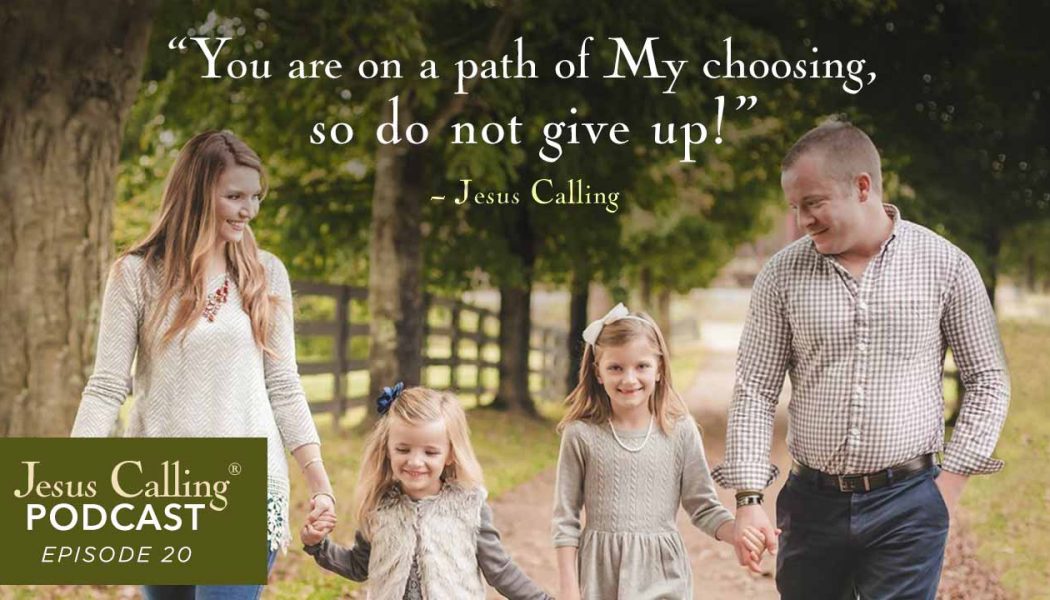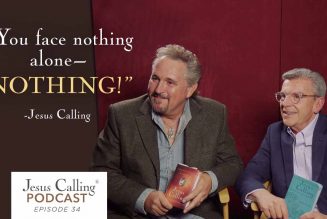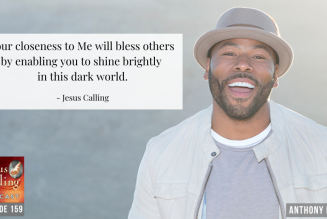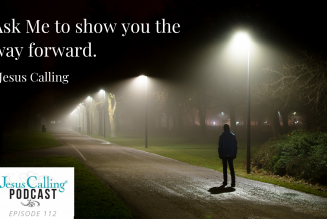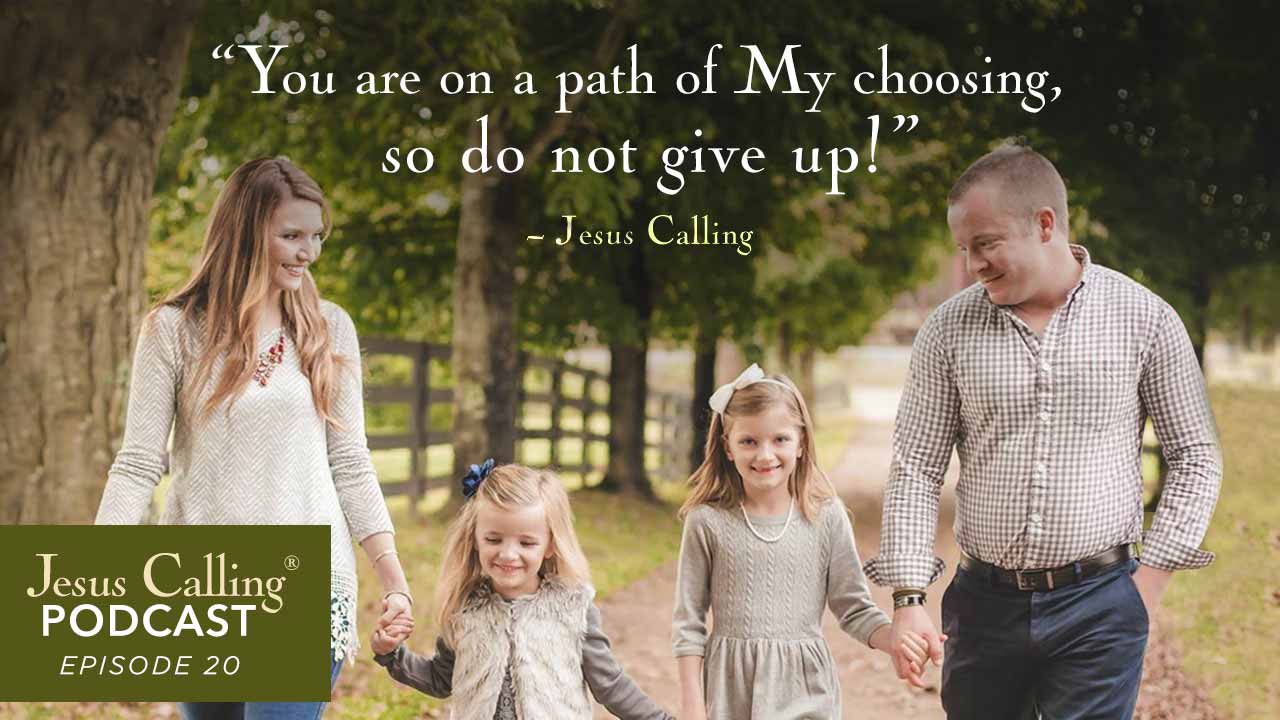
Zachary Bell is a husband, father, and veteran. He served as an infantry rifleman in the United States Marine Corps, and did two combat tours in Afghanistan. Zachary discusses his time in service to his country, how it affected his family, and how the Journey Home Project helped him successfully navigate his post-military life.
The Journey Home Project
Narrator: Welcome to the Experience Jesus Calling Podcast. The Journey Home Project is an organization that assists veterans who are returning from active duty to civilian life. Their mission is to connect donors to veteran organizations that do the most good to help with this sometimes difficult transition. Country music legend Charlie Daniels is Chairman of the Board for the Journey Home Project and talks about why this organization is so important.
Charlie Daniels: I learned very early in my life and I say this on stage every night “Only two things protect America. It’s the grace of almighty God and the United States military.” It’s that way in 1941, it’s that way this year, next year, the year after; as long as this country remains free, it will be that. It’s a part of who I am to respect and support the military.
That’s what Journey Home is all about. We try to soften the landing for our military men and women who come back from service, most of them from battle areas, combat areas.
Meet Zachary
Narrator: Zachary Bell is a husband, father, and veteran. He served as an infantry rifleman in the United States Marine Corps, and did two combat tours in Afghanistan.
Zachary Bell: My name is Zachary Bell, and I was an infantry rifleman, and when I left the Marine Corps, my last job, I was a infantry squad leader. My job was just to protect the people wherever I was at, and to try and provide some form of stable government by assisting the people in Afghanistan, and also to fight enemy combatants.
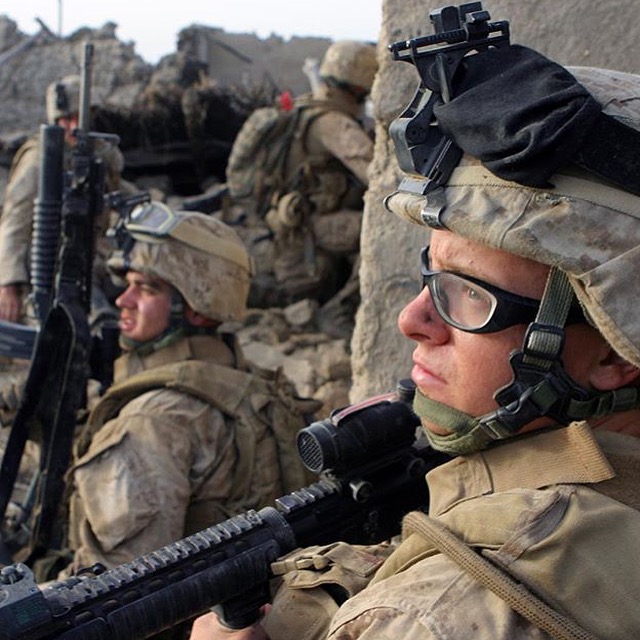
I grew up in Memphis, Tennessee, in West Tennessee, and growing up, I was a troublemaker. I’d say the thing I did most was cause trouble. I was just always “wild at heart,” is what my grandmother used to say.
My parents got divorced when I was really young, and I started to realize the different levels that people had of income or economic status some people have that I didn’t have.
We were poor growing up…so It really was hard. I remember my mother always working, but I also developed at a really young age this idea of independence and wanting to provide for myself.
Me and my little brother would walk to the school bus stop, which was just down the street, and I remember my mother called me and she told me that we needed to stay home, and to turn on the TV, and she didn’t know what was going on, but we just had to stay home, and I turned on the TV. I was like, “Okay,” and I was like, “What do you want me to do?” And turned it to a news channel, and I just turned it to the first one I found, and I remember just looking at the first tower being on fire, and then I saw the second plane go in live. I just remember being shook to my core, and it just terrified me.
All these things were happening, and it was terrifying, but I remember thinking I wanted to do something, and we watched it for days and days like everyone else did, and I remember President Bush came down there and he’s walking around Ground Zero, and they said, somebody yelled something at him and said “we can’t hear you,” and he said, “I hear you,” and I just remember that moment, being like, “I want to do something about this.”
The Decision to Serve
I was a train that was off the tracks, that didn’t even need tracks. I was just going. It was nothing that was really nefarious. It was just that I feel like young boys at that time are kinda crazy a little bit because you’re trying to figure out what it means to be an adult, and a man, especially me growing up without a father in the household.
When I graduated high school, I just wanted to go to college. I was one of the first people in my family to ever graduate high school, definitely the first to ever talk about college at that time, and I had a cousin who was in the Marines at the time. He joined about four years before I did, and I remember looking up to him a lot, but I just wanted to try and make something of myself, because by that time, I’d decided I wanted to kind of blaze my own trail, and find a new path.
I started going to the recruiter, and I think it was December I made my decision. I wanted to enlist. That was when I did it. I left in February.
I needed to be accountable. I needed to grow up.
There’s a Navy Seal who has a podcast, and he has this saying that I really, really like, and it’s “discipline equals freedom,” and I’ve spent about a month lately thinking about it, because I was trying to figure out what that meant, but when you do have discipline, you do actually have freedom in it, because you’ve provided yourself structure and boundaries in ways you didn’t think that you had previously, which is really what I needed. I needed to be accountable. I needed to grow up.
It’s just because I had this thing to prove to myself. I wanted to prove that I could stand on my own, and as time went on, I started to really find my groove with it, and I don’t remember when it happened exactly. I just remember being like, “I’m pretty good at this.”
They’re teaching you classes and stuff, and it just clicked. The pieces just fell in place, and I can remember that moment, not what was happening. I just remember being “this comes to me.” It almost felt like I was born to it in a lot of ways.
So the challenges were shortly after leaving boot camp, I went to the school of infantry for about 12 weeks, and then you go from there to a unit, and there were a few friends of mine who went from boot camp; we all went to the same unit. And by that time, I was married, and my wife had actually conceived our first child, and they told us our unit wasn’t going to Afghanistan. I remember being disheartened about that. But February of ’08, after training the whole time, they came to tell us, “Hey, you guys are going to Afghanistan in like a month, not even a month, like two weeks, and so you guys got to get your stuff together,” and so my wife was fully pregnant, packing the car, trying to get everything back home. My unit actually ended up leaving, and I ended up traveling late, because the day they left, my wife had started to go into labor and my daughter was born, and two days later, I was leaving for Afghanistan.
The Selfish and Selfless Choice
It was hard, because until that moment, I had selfishly wanted to go the war, and then I’m holding my first child, and I couldn’t care about anything else than that, right there, and it was hard.
We just cried. We were at the Nashville airport and it was the only time I ever traveled in the military and got upgraded to first class was because so many people saw us crying right at the gate and security, and I’m in my uniform and I didn’t know if I’d ever see them again, but I knew I was going to do whatever I could to try and make that happen, and it was terrifying. I talked to her a few times travelling over there, but once the mission started, I didn’t talk to her for a better part of three months, until I was able to tell her “I’m okay, I love you and how are you doing?” That was only like a 15-minute phone call, and then after that, we got to call every month for like 30 minutes, but outside of that, it was just writing letters to each other and to my daughter, and she would send packages and pictures and stuff.
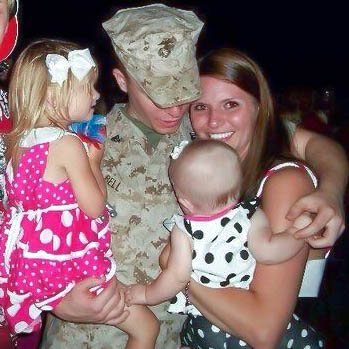
My success, my military career was always a thing that was there, but it didn’t matter because my ultimate goal was to be a successful husband and father. You can do both, but in my opinion, it’s very, very hard. Someone once told me that being in the military is one of the most selfish and selfless thing you’ll ever do. It’s very selfish because a lot of what you’re doing dictates what your family does, where you move, where you go, what life they all get to live, but it’s also selfless because you’re giving yourself to a life of service that you’ll ultimately won’t be able to make the last decision on, and that’s how I feel about it to this day, too.
I would say that the biggest impact to me in my military career was the time during my second deployment, so my first deployment, I’d wanted to be in combat, and we were in combat, but it always felt like we were winning because we always had superiority at all times, like we never felt surprised or anything. We were owning the battle space, as the phrases they would use, but they told us we’d go to Iraq for 90 days, so me and my wife, Christie, we said, “Okay, we have our daughter, Elisa. Let’s try for a second child,” and, thankfully, we conceived our second child, Audrey.
So when the president went to announce the troop surge in 2009, that was actually … that was when they told us we were going back to Afghanistan.
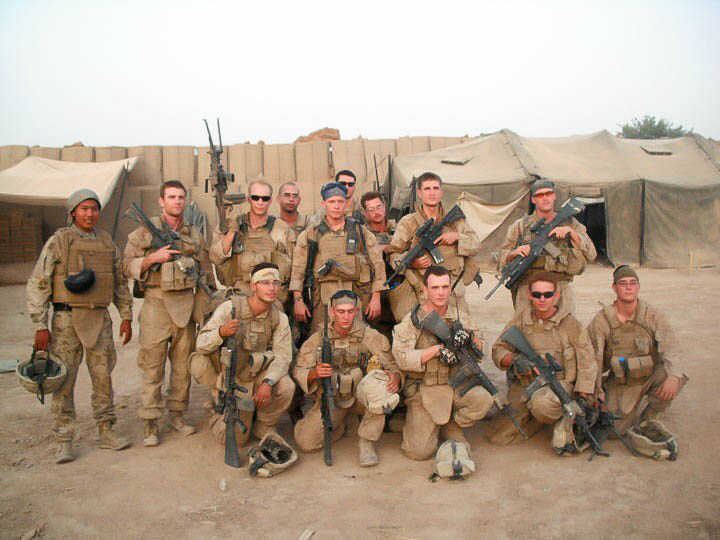
You know, they made movies about it and stuff, it was called The Battle of Mars and all these different things. It’s weird because people hail it in Marine Corps history, because of all these different things that happened, and I’m very proud of my time in the Marine Corps, and especially that.
We would go on what were known as combat patrols, which means that every time we left our positions, it was not if we saw the enemy, it was when we saw the enemy what would happen. They were, you know, we lost a lot of people. It just really shaked me in a way that I wasn’t prepared for…
It was hard…it was hard. When someone gets hurt that you’re in charge of, or different things like that, it shapes things about you that you’ll never really fully understand until beyond that moment. That was when I decided that I’d given all that I’ve got. I’ve got awards, I’ve reached this job and this rank that none of my contemporaries have. It’s just time to hang it up.
Nobody in charge of me was happy, because they were trying to get me to re-enlist, and I told them no. You’re instantly out of the club, because they feel betrayed. I get that, but you have to make the best decision for you and your family. You can’t be a gunslinger forever. That’s what I told all my guys, and that’s what I was always told. You know, it’s just that I wanted … I couldn’t keep leaving my family.
I’ve got awards, I’ve reached this job and this rank that none of my contemporaries have. It’s just time to hang it up.
Returning Home
Narrator: Though the military taught Zachary valuable things about teamwork and communication, his transition back to civilian life wasn’t seamless.
I was in charge of twelve, fifteen people when I left. I had a really good career. We were living with my mother-in-law. All of us, my four people in my family, are in one bedroom. My mother-in-law changed around her whole house to make another room into a bedroom for her so we could live there until we got our lives together. It’s hard not to feel like a failure in those moments, because you’ve made a decision you thought was best at the time, which it was, but it doesn’t mean that it’s not hard.
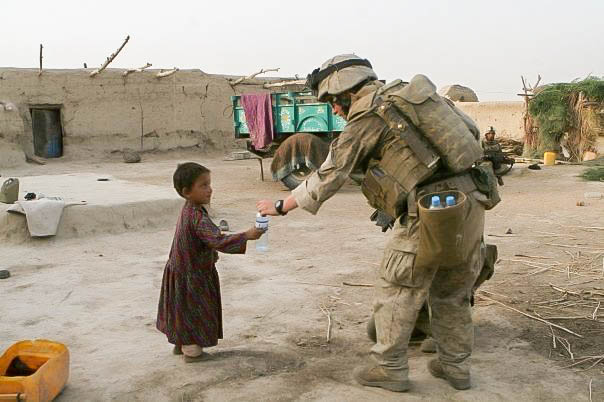
The Journey Home Project was something I’d heard about, and I was going to a different school in Middle Tennessee at the time. I was going to Middle Tennessee State University. I wasn’t really sure what I wanted to do with my life, but I’d heard that there was this Veteran’s Program at Lipscomb, then I found out about the Charlie Daniels scholarship, and all these different things, all these different resources that they have that they connect you to, to get you back into a different place and an environment to succeed because in my best estimation, I feel like the hardest part about transition out of the military is being completely unsure of what to look for and how to look for it. Just working with them made that seamless.
We’ve done all sorts of stuff since. I was able to get my undergraduate degree at Lipscomb University, and I just finished in May with my Masters. Things I didn’t think would ever happen I’ve been able to do. Working with them, I’ve seen the impact they’ve had on my life and many others just by giving people in the military … actually, people all over the nation now, giving veterans and their family members the opportunity to be connected and to learn about resources that are out there. It’s awesome.
Giving Back to Those Who Serve
Narrator: Charlie Daniels explains why he is committed, through The Journey Home Project, to help men and women like Zachary, be successful in their return from the military back to civilian life.
Charlie: I’ve been among these guys. I’ve been into war zones with these guys. I’ve seen them. They spend their time in places you don’t even want to go to where there’s nothing. Some people seem to think for some reason or another that our military people have an extra gene that isolates them from missing their families and loneliness and that sort of thing. It’s not so, they miss their families just as bad as anybody else does that’s away from them. They go and do that because they’re patriots and the least that we can do is respect and support them. I’m there. I respect them. I support them. And that’s what Journey Home is all about.
Zachary: Don’t be afraid to reach out or to ask for help. There’s many resources out there, you know, to know that anybody can do it. Because if I can, anybody can.
I respect them. I support them. And that’s what Journey Home is all about.
Jesus Calling is an amazing book. I think what appeals to me most about it is that it’s … I’m always trying to find time, even where I can’t find it, and it’s just … It takes just a moment to tap in and you can really just re-center yourself and get some wisdom and carry on.
A lot of devotionals sometimes I feel can be too vague or talk about concepts in such a large way, but this is just talking about just enjoying peace in His presence and what that means in your life.
Narration: Zachary is proud of his contributions during his military service and is committed to helping other veterans who might be having a tough time returning to civilian life, by showing them that there is hope beyond the battlefield.
Zachary: The most important thing I’ve gained from it is that I got to really share parts of my life after the military with my family. They get to be a part of this too and we continue to serve as a family with the local community.
It’s something, I’ll miss it always, but you know, I’d much rather be front-row center at a cheerleading or a gymnastics competition, and that’s just more important to me because this is what I wanted to do. This is what I want to do.
Narrator: Next time on the Experience Jesus Calling Podcast, we talk with Diane Cunningham, the President and Founder of the National Association of Christian Women Entrepreneurs. Diane is also an artist, plane crash survivor, marathon runner and author. She candidly talks to us about reaching several “rock bottom” places in her life and how she can look back now, and realize how God was drawing her closer to His side.
Diane: I think I was afraid about money, I was afraid about “am I gonna make it, is this all gonna work, what’s gonna happen, what do I need to do,” just all those fears would rise up when I got done with my so called “work day,” and I didn’t know what to do with them, I didn’t know where to put them. And they still rise up, I mean, let’s be honest. But I have a place and a way, and a toolkit now that’s different. I don’t have to drink over them. I go to my meetings, I meet with my sponsor, I meet with other women in recovery, I ask for the help that I need and I know that all I have to take care of is one day at a time.
Narrator: Our featured passage for today’s show comes from the February 7th entry of the Jesus Calling audiobook.
Come to Me for rest and refreshment. The journey has been too much for you, and you are bone-weary. Do not be ashamed of your exhaustion. Instead, see it as an opportunity for Me to take charge of your life.
Remember that I can fit everything into a pattern for good, including the things you wish were different. Start with where you are at this point in time and space, accepting that it is where I intend you to be. You will get through today one step, one moment at a time. Your main responsibility is to remain attentive to Me, letting Me guide you through the many choices along your pathway.
This sounds like an easy assignment, but it is not. Your desire to live in My Presence goes against the grain of “the world, the flesh, and the devil.” Much of your weariness results from your constant battle against these opponents. However, you are on the path of My choosing, so do not give up! Hope in Me, for you will again praise Me for the help of My Presence.
Narrator: Hear more great stories about the impact Jesus Calling is having all over the world. Be sure to subscribe to the Jesus Calling Podcast on iTunes. We value your reviews and comments so we can reach even more people with the message of Jesus Calling. And if you have your own story to share, we’d love to hear from you. Visit JesusCalling.com to share your story today.
